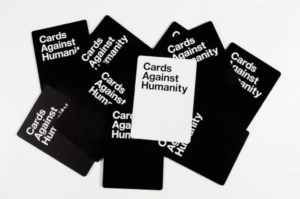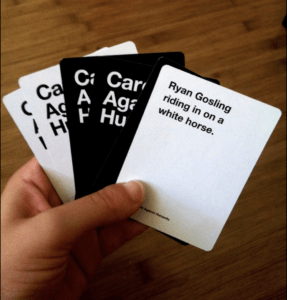

The game I chose is Cards Against Humanity (CAH), which is a judging card game targeting 18+ audiences. It allows for 2-30 players, but I find there to be a lot of problems once you exceed 8 players. To play the game, players start off by drawing 10 white cards each. One player (the Card Czar) will start by picking out a black card, read it out loud, and place it down. The card can either be a question card, or a fill-in-the-blank card. Then, everyone responds by placing a white card face down that they think makes the funniest/best combination with the black card. The Card Czar will then shuffle the white cards to keep anonymity, and begin reading them in combination with the black card, one by one to everyone. The Card Czar then picks the white card that they thought was the funniest and the player that placed it gets a point, and can then pick out the next black card.
The game is pretty distant from our game, and involves vastly different mechanics. In CAH, the most prominent mechanic that drives a lot of interaction is also the one that decides the winner of the games. By judging cards based on how “funny” they are, the game surrenders a lot of responsibility to the players and their group dynamic. This subjectivity ends up being a double-edged sword, and as a result, how well a game is played varies widely. In a group of friends that also has the same type of humor, this leads to a dynamic where players are able to use inside jokes, make fun of each other more, and create an overall more authentic environment.
However, when the group of players are not that particularly acquainted, games can stagnate into a series of either uncomfortable, awkward, and unfunny situations as different senses of humor clash, the ability to banter is lost, and people struggle to navigate the politically incorrect nature of the game. This judging mechanic forces people to ride the fine line between being funny and being offensive, which is much harder when you’re not close with the group. This can quickly create an environment where some people might be walking on eggshells since they don’t know others’ personal limits, and others might get offended.
The judging factor can also create a two-way incentive in the previously mentioned scenarios. Players want (I would argue even need) to feel perceived as funny in the game, and this can motivate players to put their best effort into a funny dynamic within their friend group in the first scenario, or shut down in fear of being judged in the second scenario. Outside either scenario however, and while this is a hit-or-miss, the game also has a significant ability to break the ice amongst those not well-acquainted given the right circumstances. One can argue that if you can be yourself around these new people in a game with sensitive humor, you may have found yourself potential friends.
I do have one critique, though. While there are pros and cons to this type of judging, I do believe that the cards themselves can include references that most people are not familiar with, which can kill the mood pretty quickly especially if a lot of the players’ cards include those. It also seems to be a single type of politically incorrect humor. I feel like they can integrate different types of humor (that is also politically incorrect) to balance the judging power of the Card Czar and give options other than to completely conform to one dimension of even their humor.



